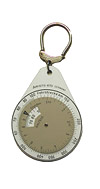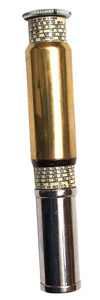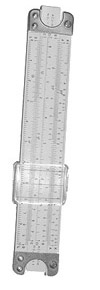 |
|
|
|

|

|
The Why and How of HOC collecting |
|


|
|
Officially, I became a History of Computing
collector in 2001, when I used a long vacation to create an
exhibition of computing history for my workplace. But informally,
I’ve been doing it for most of my life. Evidently, it resonated with my way of looking at
technology... and I suppose this explains why I find it so
enjoyable. Here are some tips and insights about this hobby, in case you want to give it a try yourself. Why collect HOC artifacts?Why collect anything? Because it’s fun, primarily; and because if done right, it can be intellectually stimulating. This hobby gave me occasion to deepen my knowledge in an area that fascinates me, learn many interesting stories, make new friends...It’s amazing how the sight of an old slide rule can excite people. The reaction of people of all ages to the HOC exhibit I made for Intel is always the same: they glance at the items idly until their eye catches some artifact that they had in their youth, or that their father had, or that their grandfather showed them as children... and then they grow all excited and start explaining it to anyone around them with great animation! As it happens, I like to share knowledge, which is why I often volunteer to teach courses and lecture to visitors in the course of my work. Since starting this collection I’ve worked artifacts and anecdotes from the history of computers into many of these lectures, and this never fails to fascinate the audience. If you start collecting, I encourage you to share your hobby with others -- exhibit your collection, lecture about it, or show it online as I do here. You will find it very rewarding. In fact, my traveling exhibit and its online version brought me unexpected "fame", to the point that some people I never met before wrote me or even donated items to my collection in gratitude for the pleasure they got from it. You’d never think that collecting old slide rules could help one make friends, would you?... |

|
|
How I got startedA radio-electronics hobbyist since my teens, I kept collecting what we amateurs affectionately called “junk”, electronic bits and pieces that might come in handy some day. This accumulated slowly in boxes in my basement. Then, during that vacation in 2001, I took some time to rummage through those boxes, and I found that I had a small but varied collection of items representing the development of electronics and computers over the years (I’d always had a fascination for the progress of technology over time, and the “junk” reflected this point of view). From this raw material I distilled an exhibition of computing technology history for Intel, where I worked, which traveled around the world from museum to museum!After the Intel exhibit was done I constructed a small showcase at home, and started collecting computing artifacts more explicitly. |

|
|
What to collectAs with any collection, there are many answers to this question. Some people will collect any item they can get their hands on; others will specialize in a specific subcategory, such as circular slide rules or crank operated desk calculators; still others specialize in a particular period or country of manufacture.In growing my own modest collection I follow primarily my gut feeling, but it seems that I end up obeying (somewhat loosely) the following criteria:
A sample of the collection is presented on this web site, so you can judge for yourself how well it meets these criteria. |
 |
|
Where can one get this stuff?There are a number of sources for computer history artifacts:
Of course, it can’t hurt to be in touch with other collectors... a good way to find them is to join the Oughtred Society, which has an online swap sheet for members and a wealth of information. Have fun! |
|
|
|
|
|
|
|
Home | HOC | Fractals | Miscellany | About | Contact Copyright © 2005 N. Zeldes. All rights reserved. |
|